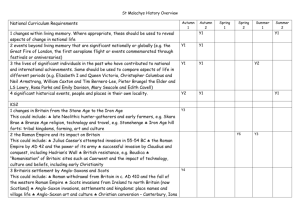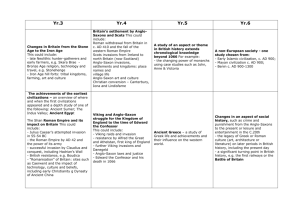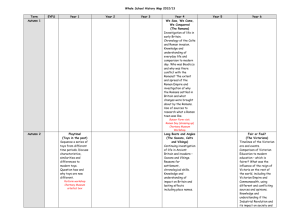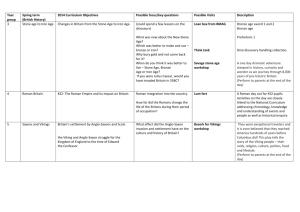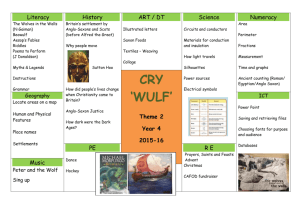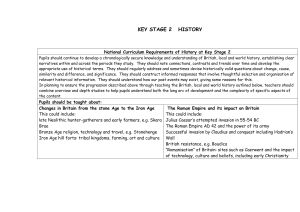Enquiry Ideas for Key Stage 2
advertisement
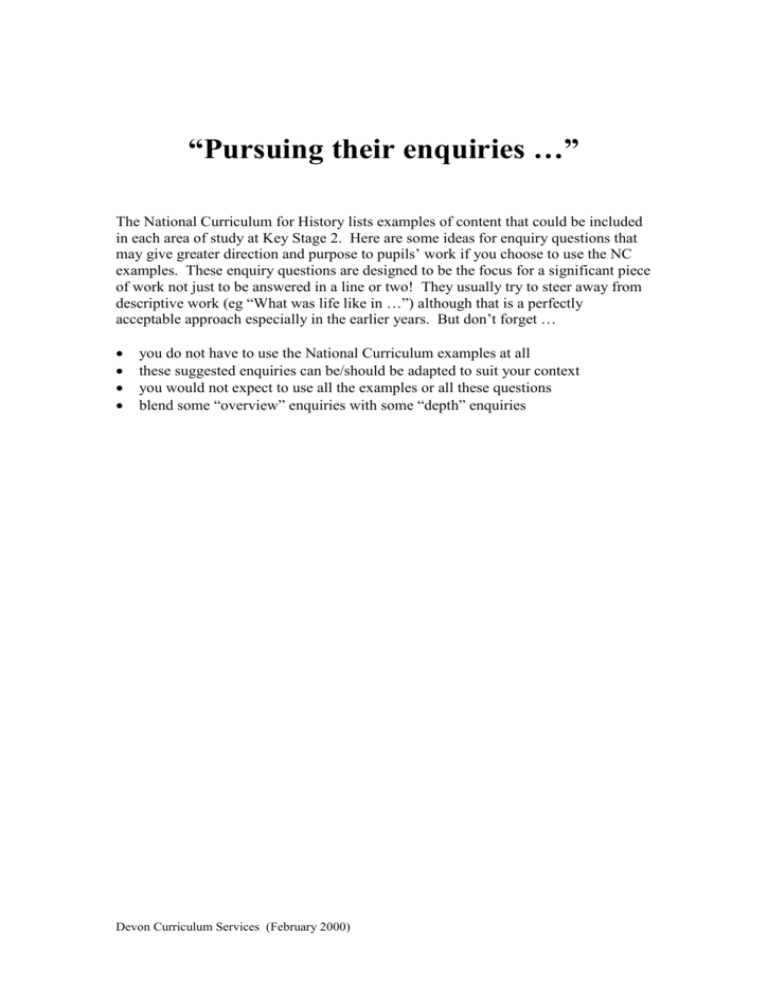
“Pursuing their enquiries …” The National Curriculum for History lists examples of content that could be included in each area of study at Key Stage 2. Here are some ideas for enquiry questions that may give greater direction and purpose to pupils’ work if you choose to use the NC examples. These enquiry questions are designed to be the focus for a significant piece of work not just to be answered in a line or two! They usually try to steer away from descriptive work (eg “What was life like in …”) although that is a perfectly acceptable approach especially in the earlier years. But don’t forget … you do not have to use the National Curriculum examples at all these suggested enquiries can be/should be adapted to suit your context you would not expect to use all the examples or all these questions blend some “overview” enquiries with some “depth” enquiries Devon Curriculum Services (February 2000) Local studies (can be linked to eg Victorians) (A study investigating how an aspect in the local area has changed over a long period of time, or how the locality was affected by a significant national or local event or development or by the work of a significant individual). How can we know about (X Change, Y Consequence, Z Person)? What can tell us most about (X Change, Y Consequence, Z Person)? How typical was (X Change, Y Consequence, Z Person) of that time in History? How great were the changes to (X place) when Y event happened? What were the most important changes in (X place) between (date) and (date)? How could (eg the tourist board/National Trust) create more interest in …….. as an historic site? (For lots more ideas get “A Devon Approach to Using Buildings and Sites” from DCS office) Romans, Anglo-Saxons and Vikings (Overview of all, one in depth) (An overview study of how British society was shaped by the movement and settlement of different peoples in the period before the Norman Conquest and an indepth study of how British society was affected by Roman or Anglo-Saxon or Viking settlement.) How similar were the invasions of the Romans, Anglo-Saxons and Vikings? Why did the Romans invade Britain? How/Why did Boudicca resist Roman rule? What can the story of Boudicca tell us about Celts and Romans? Why is Boudicca famous today? Why did the Romans do so much building? How does Exeter remember its Roman past? Why did the Anglo-Saxons invade Britain? How much can the Sutton Hoo burial tell us about Anglo-Saxon life? What have the Anglo-Saxons left us? Was Alfred “Great”? Who did what in Anglo-Saxon Britain? What did people believe in Anglo-Saxon Britain? What does the story of (Bede and/or Hilda) tell us about Anglo-Saxon times? What signs remain that ….. was once an Anglo- Saxon village/town/area? Why did the Vikings invade Britain? Why were Viking raids so successful? Or How successful were Viking raids? What can archaeologists tell us about Viking life in Britain? (Jorvik) How/Why did Alfred resist the Vikings? What have the Vikings left us? Do the Vikings deserve their violent reputation? Devon Curriculum Services (February 2000) Britain and the wider world in Tudor Times (A study of some significant events and individuals, including Tudor monarchs, who shaped this period and of the everyday lives of men, women and children from different sections of society.) What was important to Tudor people? Why were monarchs “majestic”? What problems faced Tudor monarchs? (can include all sorts!) What can the story of Thomas More tell us about Tudor times? How much can the Mary Rose tell us about Tudor times? Was exploration worth the effort? What made the theatre so popular? Who looked after the poor in Tudor times? Were poor people lazy people in Tudor times? Who did what in Tudor towns/countryside? What would surprise us most if we travelled back to Tudor times? How did life at the court of Elizabeth compare with the court of Akbar? (Or Henry VIII/Montezuma!) Who thought what when the Queen came to stay? (Role play of a Royal Progress) Victorian Britain (or Britain since 1930, see below) A study of the impact of significant individuals, events and changes in work and transport on the lives of men, women and children from different sections of society. What changed in Victorian Britain? What can the story of (Lord Shaftesbury/Robert Owen/E Fry etc) tell us about Victorian Britain? What were the similarities between the achievements of (Person X and Person Y)? How should we remember (ie commemorate) Person/Event X, Y or Z? Who should jump? (Ie a “balloon debate” between several Victorians with claims to fame) Who did what in a Victorian city/factory/country house? Who looked after the poor in Victorian Britain? What makes a good display on the effects of steam power? How did people relax in Victorian times? How did the railways change people’s lives? Devon Curriculum Services (February 2000) Britain since 1930 (or Victorian Britain see above) (A study of the impact of the Second World War or social and technological changes that have taken place since 1930, on the lives of men, women and children from different sections of society.) Why do people disagree about evacuation? What makes a good historical story about the evacuation? (Ie accurate facts and a feeling for the past) How can we know about life in the Blitz? How did the Blitz change Exeter? Was life miserable in Britain while the war went on? How did the Second world war affect our (families/town/village/school)? Do local memories of the war match what the text books tell us? Who was depressed by the Depression? How has life changed in Britain since the war? Which invention has done most to change life since 1930? Who looked after the poor in 1950? What can the Festival of Britain tell us about life at the time? Ancient Greece (A study of the way of life, beliefs and achievements of the people living in Ancient Greece and the influence of their civilisation on the world today.) What can the Olympic games tell us about the Ancient Greeks? What do Greek buildings tell us about Greek life and beliefs? What did it mean to be a citizen of Athens? Did slaves suffer in Ancient Greece? What mattered most to the Spartans? How was life different in Athens and Sparta? How healthy/well-educated were the Ancient Greeks? Who did what in Ancient Athens? OR Who did most to make life work in Ancient Athens? Why was trade important in Ancient Greece? How did Greek beliefs affect daily life? What was important about the battle of Marathon? Why was Alexander “Great”? What was so special about great Greek thinkers? World Studies/Non European Civilizations: (A study of the key features, including the everyday lives of men, women and children, of a past society selected from: Ancient Egypt, Ancient Sumer, the Assyrian Empire, the Indus Valley, the Maya, Benin, or the Aztecs.) Apply the principles from the enquiry lists shown for other areas of study Devon Curriculum Services (February 2000)
